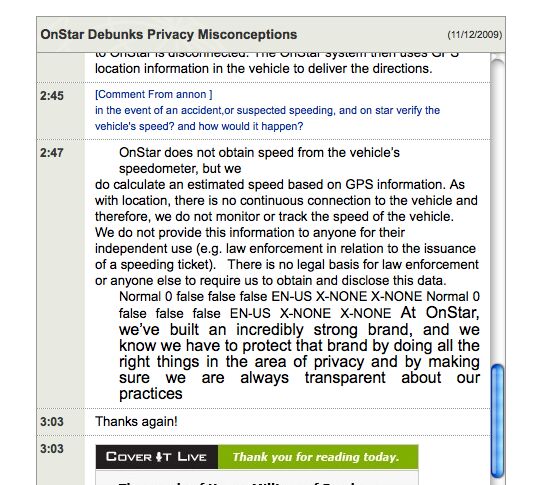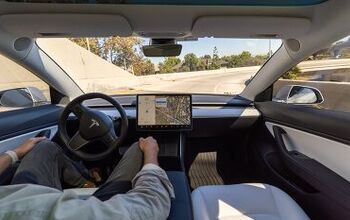4 Views
What's Wrong With This Picture: Onstar Puts Us At Ease Edition
by
Edward Niedermeyer
(IC: employee)
Published: November 13th, 2009
Share
OnStar’s Privacy & Compliance Officer Jane Speelman has an “I can’t let you do that Dave” moment in a Fastlane webchat titled “Onstar Debunks Privacy Misconceptions.” Yikes!
Edward Niedermeyer
More by Edward Niedermeyer
Published November 13th, 2009 5:36 PM


































Comments
Join the conversation
I wonder if Ms. Speilman [sic] would tell us how to disable OnStar, or if that action would in any way violate the new vehicle warranty.
Want to disable OnStar? Stop paying for it. Of course, that won't stop the telemarketing calls, but you won't be able to access OnStar or they you. On a related note, every car company now uses some sort of 'black box' to collect different kinds of information, this data is being collected on you every time you turn the key. And more importantly, the data collected in those devices is subject to differing federal, state/provincial and local laws, of which very few people are aware of what rights they have under these laws. Not a lot of disclosure or discussion on these laws, but could affect you a great deal more than any 'observation' by OnStar.
As starbird80 said, it should be possible to disable OnStar by disconnecting the antenna it uses to communicate over the cellular network. OnStar may be too well integrated into other features of a GM car to just pull the fuse, but disconnecting the antenna should render it deaf and mute. I'd be curious how long it takes to overwrite data on a car "black box". Could someone put enough miles/hours of operation on the car after a crash Ferris Bueller style to overwrite the data before lawyers can get involved?
Removing the OnStar antenna would just keep it from communicating with the mother ship over the air (cellular system). The GPS antenna would still be intact and usable by the system to calculate and store your speed for later retrieval (assuming this feature was designed in). Cutting the GPS antenna would only be an option if the car did not have a factory navigation system. As geozinger stated, cars nowadays have data recorders. The collected data (time graphs of engine speed, vehicle speed, brake application, headlight status, seatbelt status, gyro, etc.) are available to law enforcement via subpoena. I have no idea how many seconds/minutes of info they capture. Also, if someone in the car has a cellphone, vehicle speed and itinerary can be roughly determined based on cell tower hand-off time stamps. Regarding doing a Ferris Buehler on the odometer: There are typically tamper evident seals on the instrument meter assembly to prevent access to the odometer's electronics, and the electronics are designed so the numbers cannot be decremented. I would imagine that the engine control module (computer) also keeps track of mileage as a backup, since it has access to wheel sensors used for ABS, and its data could be compared with the odometer's to verify accuracy. Some cars will store error codes in the event speed signal lines are cut (newer Toyotas with nav do this, likely b/c many owners were cutting wires to bypass the nav nanny lockout that engaged when the vehicle is moving).